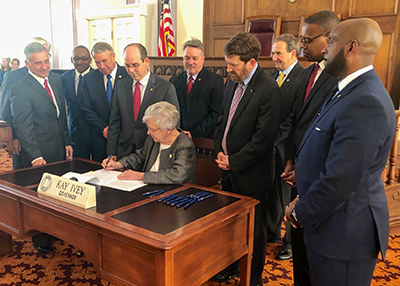Gov. Ivey Signs Rebuild Alabama Infrastructure Package

The Alabama Senate passed the Rebuild Alabama infrastructure plan Tuesday by a 28-6 vote, and Gov. Kay Ivey signed the measure into law during a ceremony at the Alabama Capitol.
“Today is an historic day for the great state of Alabama,” Ivey said. “What the members of the Alabama Legislature have done today is improve Alabama’s infrastructure for generations to come. Legislators from different parties from different parts of the state have come together not to make an easy decision, but to make a bold statement that they are ‘all in’ when investing in Alabama’s future.”
Alabama Farmers Federation External Affairs Director Matthew Durdin said the fuel tax increase will spur economic growth in rural Alabama.
“This plan greatly increases funds available for farm-to-market roads and bridges,” Durdin said. “It includes strong accountability measures to ensure taxpayer money goes to visible improvements while enhancing the export capacity of the Port of Mobile.”
The centerpiece of the Rebuild Alabama plan was HB 2, sponsored by Rep. Bill Poole, R-Tuscaloosa, and carried in the Senate by Sen. Clyde Chambliss, R-Prattville. It authorizes an additional 6-cent-per-gallon tax on gas and on-road diesel fuel beginning Sept. 1. An additional 2 cents per gallon will be levied Oct. 1 of 2020 and 2021, bringing the total increase to 10 cents per gallon. The current state fuel tax is 18 cents per gallon.
Beginning Oct. 1, 2023, the state fuel tax will be adjusted based on the National Highway Construction Cost Index, not to exceed a 1-cent increase every other year. An amendment to sunset the indexing provision in 2039 was tabled during Tuesday’s floor debate, but Chambliss pledged to work with his Senate colleagues on the issue during the regular session.
HB 2 also calls for increased fees for electric and plug-in hybrid vehicles of $200 and $100, respectively. The Rebuild Alabama plan does not change exemptions for off-road diesel fuel, nor does it increase annual license taxes and registration fees for other vehicles.
A portion of the new fuel tax will service a $150 million bond issue to secure federal funds to deepen the shipping channel at the Port of Mobile. HB 3 allows the state to borrow money for the port project. It passed the Senate Tuesday by a vote of 32-1.
HB 2 prohibits increased tax dollars from being spent on salaries and benefits of employees, or equipment, buildings and contractors unless directly related to an infrastructure project. Additionally, HB 1 strengthens the Permanent Joint Transportation Committee and gives it additional oversight for Alabama Department of Transportation (ALDOT) projects. A substitute of the House-passed bill cleared the Senate Tuesday by a 32-0 vote. It included changes related to the membership, meetings and responsibilities of the committee. The House concurred with the changes today by a 101-2 vote.
Durdin thanked the sponsors for listening to input from Federation members and other stakeholders.
“We appreciate Rep. Poole and Sen. Chambliss navigating this tough piece of legislation through the process,” he said. “We will now work to make sure these new dollars will be spent wisely.”
Provisions of HB 2 increasing funding for rural roads include:
25 percent of increased funds, after servicing the Port of Mobile bonds, goes to counties. 45 percent of the county portion will be divided equally among the 67 counties, and 55 percent will be disbursed based on population;
ALDOT will provide $400,000 to each county in exchange for a federal allocation which previously was reduced due to administrative costs;
ALDOT also would create a $10 million annual grant program through which counties and cities could apply for additional funds;
Beginning with fiscal year 2020, another $30-50 million would be available for local projects through the Alabama Transportation Rehabilitation and Improvement Program-II (ATRIP-II).
